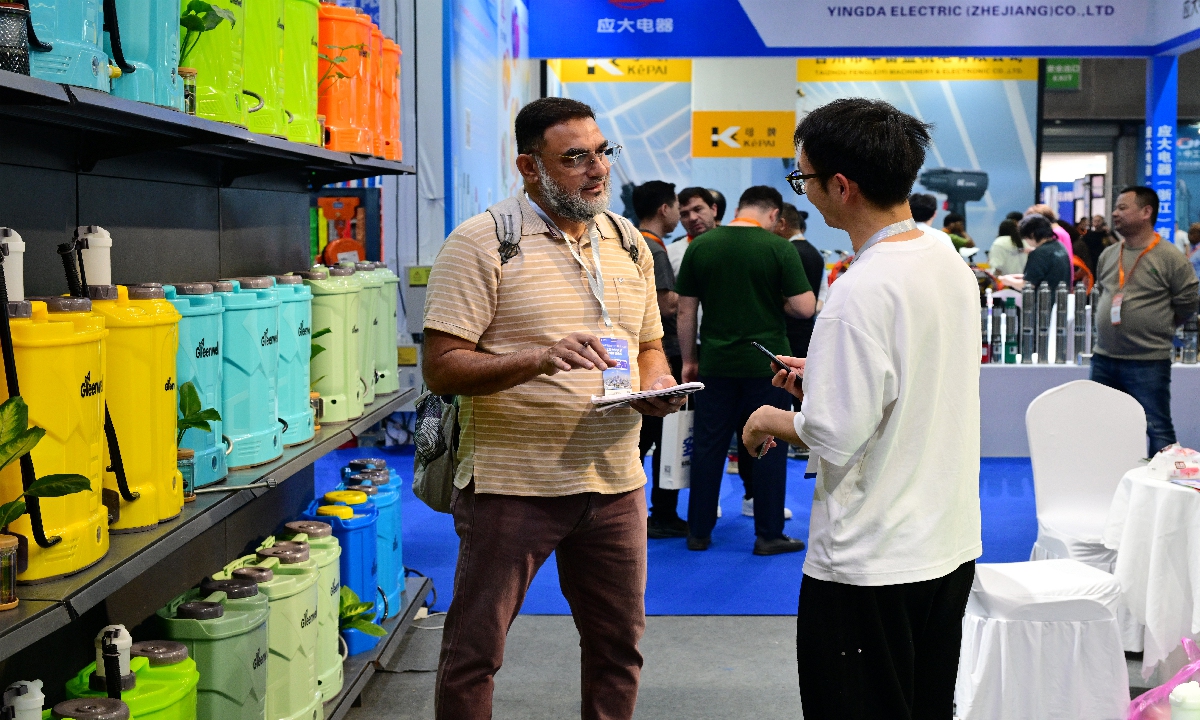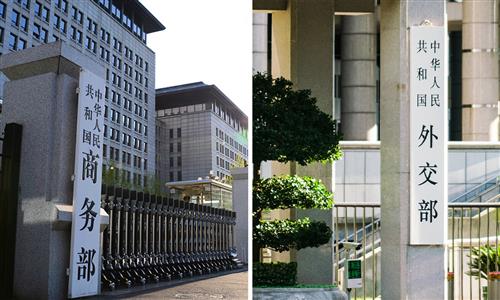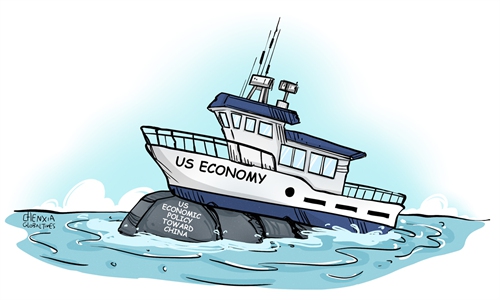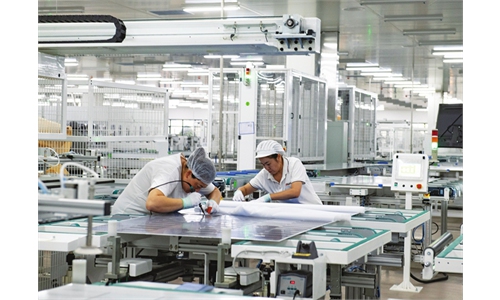
An Indian merchant (left) negotiate on purchasing sprayers at the Yiwu International Expo Center in Jinhua, East China's Zhejiang Province on April 20, 2025. The 9th China Yiwu Hardware and Electrical Expo is scheduled from April 20 to 22. Photo: VCG
Weeks after the US imposed across-the-board tariffs as high as 245 percent on Chinese goods, Chinese merchants' reactions have turned from shock to anger and then to calm. Now they are working tirelessly to cope with the impact, with the help of relevant actors in the market, the Global Times learned.
The IMF downgraded its 2025 global growth forecast from 3.3 percent to 2.8 percent on Tuesday (US time), citing the negative impact of the sweeping US "reciprocal tariffs."
The owner of a plant in Dongguan, South China's Guangdong Province, surnamed Li, said that prior to April 2, when the US had a 20 percent tariff on Chinese exports, he chose to share some of the tariff costs with his clients.
Li's company, which employs several dozen workers making products such as slippers sold in US supermarkets, has been a supplier for large US retailers such as Walmart and Target for decades.
"But when new tariffs were announced on April 2, it became clear that any negotiation with my clients has become irrelevant. Most manufacturers cannot cope with such insanely high tariffs, and we suspended processing orders from our US clients," said Li.
"Most of the factory owners I know have made the same decision. The US is dismantling international trade norms; it singles out China. This is sheer discrimination, and we have our backs against the wall," Li said. "We support the government's countermeasures in face of such bullying. We all believe China will prevail in the end."
Many business owners across China's export hubs, from Dongguan to Yiwu, the world's small commodity capital in East China's Zhejiang Province, to Chengdu, capital of Southwest China's Sichuan Province, have reported a freeze of production of US orders, as the exorbitantly high US tariffs have made trade with the US impossible.
However, these merchants were not left alone to bear the US tariff headwinds as the Chinese government, e-commerce companies and various actors in the industrial and supply chain have extended a hand.
The Port of Suzhou in East China's Jiangsu Province announced that it is offering free parking service for foreign trade containers from April 18 to July 17 to help foreign trade companies weather the current hardships, according to a post on Suzhou Fabu, the local government's official WeChat account, on Sunday.
Besides production and storage, products that had already made but whose orders had been cancelled by US importers due to the imposition of tariffs were also getting attention.
Retailers across China, including the country's largest e-commerce platforms and supermarket chain stores such as JD.com and Yonghui Superstores Co, have rolled out measures to help exporters tap the vast domestic market.
The General Administration of Customs (GAC) last week held a meeting with exporters, trading companies and representatives from industry associations to learn about companies' operations and their efforts to stabilize orders and expand into new markets, according to a statement posted on the GAC's website on April 15.
The first batch of "blocked" foreign trade goods, a total of nine types of goods under two brands, have arrived on the shelves of several Yonghui supermarkets in Beijing, Fuzhou in East China's Fujian Province and Hanghzou in Zhejiang Province, the Securities Times reported on Wednesday.
Previously, Yonghui said in an open letter to Chinese suppliers that it would offer a green channel to put stranded foreign-trade goods on domestic supermarket shelves in just 15 days.
As of Tuesday at noon, Yonghui said that it was already in touch with more than 300 suppliers, including long-time suppliers for US retail giants such as Sam's Club and Costco, to work out details and the concerned goods include frozen foods, snacks and household items, per the report.
Wang Lizong, the president of the Guangdong High-tech Industry Chamber of Commerce, told the Global Times on Wednesday that from his visits to dozens of companies in Guangdong in recent weeks, he found that Chinese companies that have yet to diversify from the US market are actively dealing with the tariff situation.
"The situation varies from company to company ... meetings, meetings and meetings … most companies I visited are brainstorming a way out," Wang said, noting that for Chinese companies, diversification and differentiation are the keys to deal with the situation.
"The high tariffs are unsustainable, but we are not planning to return to pre-tariff days either," Wang said.
US President Donald Trump met with representatives of major US retailers, including Walmart, Home Depot and Target, on Monday to discuss how broad-based tariffs will likely raise the cost of everyday goods that they import, Reuters reported on Tuesday.
Most of these retailers import heavily from China. Walmart shares are up less than 2 percent in 2025, while the others have all posted double-digit losses. Target has been hit hardest, down 32 percent so far this year, according to Reuters.




